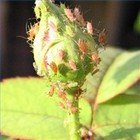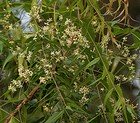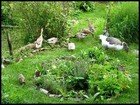Organic Pest Control and Natural Pesticides for Garden Pests and Insects
Organic pest control
methods are not only environmentally friendly but they are healthier
and generally less costly than chemical pesticides. There are
many ways
for farmers to rid of garden pests from their fields
without using
harmful
man-made chemicals known as pesticides.
The first thing you should do is take a close look at the pests that are destroying your crop. Try to identify what the insect is based on its appearance and behavior. Looking this up on the Internet can be helpful. Depending on the type of insects and plants you are dealing with your methods may vary considerably. However, once you know what insect you are dealing with it will be easier to determine the best method of organic pest control to follow.
Ants are of course a very common insect and will invade many plants. Although they don’t cause too much destruction, they can be a nuisance. One of the most common organic ways to deter ants is by planting mint. Ants will steer clear of anything around mint plants because they dislike the aroma. Be sure to strategically place the mint plants to cover the most ground around your crop. It may be best to plant some mint every few feet in the area you are trying to target.
Aphids are another common garden attacker and can be difficult to manage. Nevertheless there are some things aphids dislike that have been known to deter them from invading. A well-known recipe for natural pesticides is a mixture of hot peppers, spearmint, liquid detergent and horseradish mixed with water will keep aphids at bay. There are variations to this mixture that can be done if different insects are the problem and can be adjusted accordingly.
A simple mixture of garlic or hot peppers with water used as a spray works good for a variety of insects especially those that are known to chew. Only a little bit of crushed garlic or pepper is needed. Another popular organic pest control method is creating a mixture of tobacco and water to use as a spray. Combine some crushed tobacco plant with water and spray onto your affected plants.
Many insects including aphids despise tobacco and will stay away from your crop. Finally, if you are able to find it, insecticidal soap is a great organic pesticide that is created without harmful and caustic chemicals. Made with a combination of fatty acids and sodium this soap will kill many common pests without causing harm to humans or animals. If you are able to find this soap it would best to keep on hand for a wide range of pest problems.
As you can see there are many ways for organic pest control without the use of chemically made pesticides. Not only are chemical pesticides harmful for humans but they are especially bad for the environment and can even kill some animals that come into contact with them. Organic pest control methods are the best way to maintain your crop the safe and healthy way.
James de Haas
James de Haas is a freelance writer who has focused on writing informative articles on the subject of Pest Control. He has written numerous content advising mainly homeowners of effective techniques to the prevention of pests around the home. If you would like to see more of his articles on Pest Control please visit Pest Control Help .
The first thing you should do is take a close look at the pests that are destroying your crop. Try to identify what the insect is based on its appearance and behavior. Looking this up on the Internet can be helpful. Depending on the type of insects and plants you are dealing with your methods may vary considerably. However, once you know what insect you are dealing with it will be easier to determine the best method of organic pest control to follow.
Ants are of course a very common insect and will invade many plants. Although they don’t cause too much destruction, they can be a nuisance. One of the most common organic ways to deter ants is by planting mint. Ants will steer clear of anything around mint plants because they dislike the aroma. Be sure to strategically place the mint plants to cover the most ground around your crop. It may be best to plant some mint every few feet in the area you are trying to target.
Aphids are another common garden attacker and can be difficult to manage. Nevertheless there are some things aphids dislike that have been known to deter them from invading. A well-known recipe for natural pesticides is a mixture of hot peppers, spearmint, liquid detergent and horseradish mixed with water will keep aphids at bay. There are variations to this mixture that can be done if different insects are the problem and can be adjusted accordingly.
A simple mixture of garlic or hot peppers with water used as a spray works good for a variety of insects especially those that are known to chew. Only a little bit of crushed garlic or pepper is needed. Another popular organic pest control method is creating a mixture of tobacco and water to use as a spray. Combine some crushed tobacco plant with water and spray onto your affected plants.
Many insects including aphids despise tobacco and will stay away from your crop. Finally, if you are able to find it, insecticidal soap is a great organic pesticide that is created without harmful and caustic chemicals. Made with a combination of fatty acids and sodium this soap will kill many common pests without causing harm to humans or animals. If you are able to find this soap it would best to keep on hand for a wide range of pest problems.
As you can see there are many ways for organic pest control without the use of chemically made pesticides. Not only are chemical pesticides harmful for humans but they are especially bad for the environment and can even kill some animals that come into contact with them. Organic pest control methods are the best way to maintain your crop the safe and healthy way.
James de Haas
James de Haas is a freelance writer who has focused on writing informative articles on the subject of Pest Control. He has written numerous content advising mainly homeowners of effective techniques to the prevention of pests around the home. If you would like to see more of his articles on Pest Control please visit Pest Control Help .
RECOMMENDED BOOKS ON ORGANIC PEST CONTROL
You can Add your own Comments, Tips and Ideas on Organic Pest Control here!
We have lots of pages where you can contribute to throughout this website. We love hearing from our readers, and hope you will be one of those we hear from too. Look around our homesteading website. If you have some comments, tips and ideas on Organic Pest Control of your own, please submit them. All you need to do is type and submit. We will do the rest!
Leave a Comment
Do you have anything that you would like to add after reading this page? We would love to hear your thoughts. If you can add additional information to what has been written here you will be adding value to the website! No need to have any special skills - just type and submit. We will do the rest!
Did you find this page helpful?
Sharing is a way of saying, "Thanks!"









New! Comments
Do you have something of value to add? Leave me a comment in the box below.